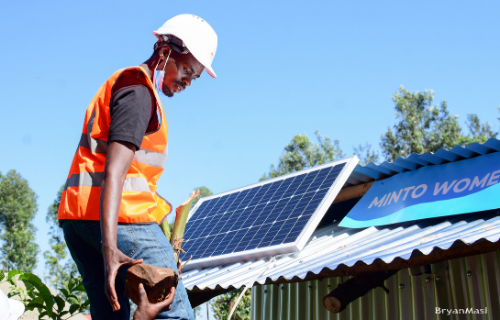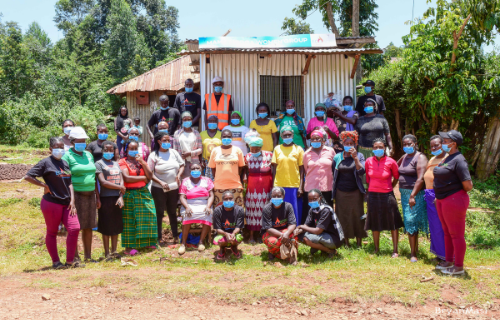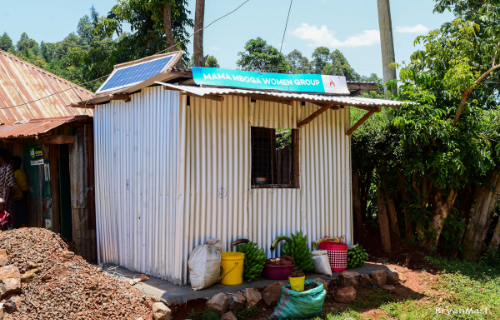How can a company not only contribute to enhancing rural access to green energy but also boosting local women entrepreneurs in a sustainable fashion? Justine Abuga, the founder of Ecobora, might have found an innovative solution in Kenya with inexpensive ‘rent-a-shelf’ solar retail kiosks. These frugally designed kiosks cost just a few hundred dollars, and are built by the community for the community, using local materials. Local women entrepreneurs use the kiosks to sell bio-fuels, their own agri-produce, and other beneficial products. Distributors can ‘rent-a-shelf ’ in the kiosk to sell their products such as solar lanterns and other fast-moving consumer goods.
Investing in innovation to reach the last mile
The idea came about when Ecobora, like many organisations, experienced difficulty accessing remote communities where people live below USD$8 a day. For such communities, products like solar home systems, clean cookstoves and fuels can be life-changing - but getting these products to them is a huge challenge. However, this challenge quickly became a motivation to innovate.
Ecobora started a project that eventually became one of nine projects being piloted by the Global Distributors Collective (GDC) through its Innovation Challenge, which is made possible thanks to UK aid. The challenge crowdsources innovations from GDC members (last mile distributors), helps to bring the best ideas to life, and supports the broader last mile distribution community to replicate and learn from those innovations. The Global Distributors Collective is hosted by Practical Action, alongside implementing partners Bopinc and Hystra; with Bopinc providing technical support to Ecobora’s solar kiosks pilot.

Including Women, Sustaining Green Energy
The idea for Solar Kiosks was born from feedback given by small-scale farming entrepreneurs, namely, a collective of sales women. These women groups are quite common in Kenya and are called ‘Chamas’. They are groups of up to 50 women who work together as a collective and support each other in their entrepreneurial activities. These groups have built up a strong trust between its members and collectively make sure their entrepreneurial endeavours remain strong and sustainable. With this partnership between Ecobora and the women groups, there is a mutual benefit for each party as they help rural communities access green energy and other life-changing products.

Solar Kiosk Pilot
The women groups and Ecobara started a pilot in January 2020, and in October the 10th solar kiosk was installed. The first 10 kiosks were initially financed by Ecobora and the GDC, but will eventually be solely owned by the entrepreneurs as they pay off the kiosk through the revenues they generate from it. But the costs of the kiosks will after this proof of concept be remitted by using the capital to set up new kiosks in another village. Thereby the model creates ownership for the entrepreneurs, sustainability and scale-up opportunities.
Another important learning of the pilot focuses on the viability of the ‘rent-a-shelf’ model. On paper, this provides other distributors the chance to reduce costs of door-to-door marketing, transport costs, and education and training costs in rural set-ups in order to familiarize people with green products. By tapping into a vast network of entrepreneurial groups with existing financial means and sales experience the kiosks can become a vital sales force within communities that were previously not reached. The pilot seeks to engage at least 2 of these partner distributors.

A promising case of frugal and inclusive innovation
The CFIA and Bopinc, with the assistance of a multidisciplinary group of students from Leiden-Delft-Erasmus Universities, will conduct a study on the contribution of this new Solar Kiosk infrastructure towards an inclusive and sustainable development of the rural communities by doing an assessment of the first 10 kiosks.
Under the guidance of Dr. Greetje Shouten (CFIA, EUR, RSM), Gerwin Jansen and Yvonne Achieng (Bopinc and GDC) a student team from the minor FI4SGD (Amco de Jong, Ellen Zwerver and Marielle Portier) will investigate and assess a couple of months after the roll out of the pilot, if the kiosks have positively contributed to the lives of entrepreneurs, distributors and living conditions in the communities. The team started their study early November 2020 with the objective to provide recommendations for improvements in the design of the kiosks. The team will further develop the business case for the women groups, and assess the feasibility of recouping the kiosk in a 6-month period while generating enough income from the business endeavour to support themselves.
